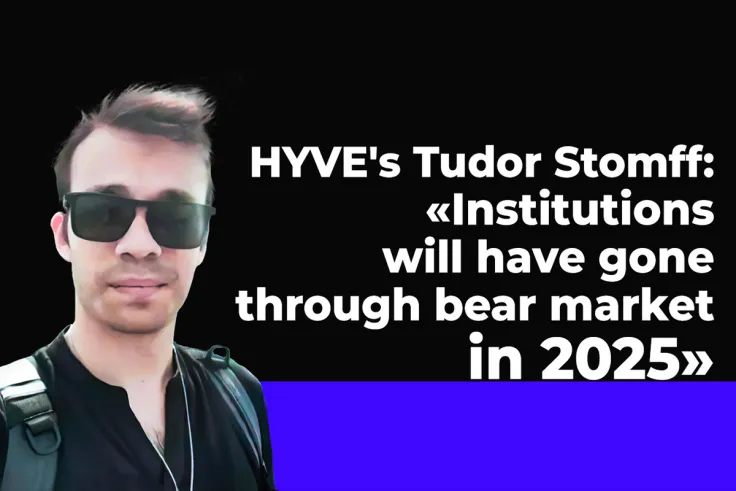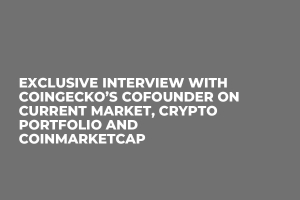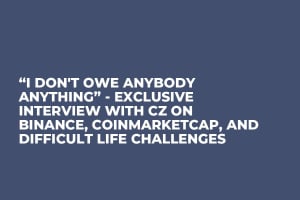
Last week, I spoke with Tudor Stomff, the CEO at HYVE, a decentralized autonomous task marketplace. We had a deep conversation about why the labor market needs a decentralized solution and how HYVE can be this solution, the consequences of Elon Musk's statements about Dogecoin and whether NFTs are in a similar bubble as ICOs were in 2007 or not. We also discussed the importance of having a real portfolio instead of investing in just one coin and why people should trust “past themselves.” If this sounds intriguing, don’t miss this piece!
U.Today: It seems that the crypto market is in its best shape yet. Cryptocurrencies reach all-time highs every day. What are your thoughts on this, and where will this trend take us?
Tudor Stomff: First of all, in my personal opinion, we are probably going to start entering the parabolic phase very soon. I know a lot of people have talked about this, including Su Zhu mentioning the whole supercycle idea. If we want to look at this from a pragmatic perspective, I highly doubt that we are going to see a supercycle this year. There are several reasons for that. But the most important one is that the technology itself is not prepared for it. The technology at this moment is not capable of supporting the change from our current infrastructure to blockchain infrastructure.
Just look at Ether. If you want to buy something on Uniswap, you're just going to pay $30-$50 in fees? If Ether goes to $4,000, all of a sudden, it's $100.
What happens to regular people? Look at it this way: in Eastern Europe, for example, the salary is around 300-400 euros per month. That means you would be able to pay for 5-10 Ether transactions, which is completely insane. At the same time, however, these are not problems without a solution; they can definitely be solved. There is also hype because a lot of institutional investors have, for the very first time in history, started giving this some attention. However, people who have been in crypto since 2013 or 2017 have been through this once already. They are prepared to see a correction.
I am not so certain that institutions like Tesla and others are prepared to see their investments go -50 percent. When that happens, the most likely outcome is that they will be forced by their investors and boards of directors to do something about it. That “something” is most likely to sell their positions. This is understandable because, from a purely economic perspective, Tesla has made more money from its Bitcoin investment than it has from selling cars in its entire history! All of a sudden, investors have this money on the table that might disappear.
So, I don't think we are going to see a supercycle. However, I do think that by 2025—and I say 2025 because, in 2024, we have the next halving. Every time a new halving takes place, people go crazy because inflation goes down and more people find out about it. This means that, in 2025, institutions will have gone through a crisis and a bear market. All of a sudden, they understand the risks and perhaps they are not going to be so careless with their money. If you are not careless with your money and not overleveraged, then you do not have the same incentive to sell because something is momentarily in a poor position.
I do believe that we have a pretty good chance to go into a supercycle from 2025 to 2029. Saying we are going to have a supercycle now, in my personal opinion, is just a dream. I understand that people want this, but it is unlikely to happen. The technology is not ready for it. However, by 2025, you know, maybe Cardano is going to finally launch their smart contracts. Maybe Ether is going to solve their fee issues. Maybe we will see which one of the Layer 2 solutions is actually going to be successful. Is it going to be Solana? Is it going to be Avalanche? Is it going to be Elrond? Is it going to be Algorand? There are so many different options still. Which of the companies that does insurance is going to be successful? Which of the companies that does lending is going to be successful? We will be at the point where, I hope and believe, the technology will be ready to start onboarding the existing infrastructure and move it all onto the blockchain. That is a catalyst that could create the first supercycle in crypto.
Right now, from a developer perspective, I do not think we are ready for it. People want it so much that they have started to justify it and are just dreaming. I believe that, for the next four or five years, the main focus should be: What can I build on this? How can I use this technology to actually make an impact and build something useful? Not “how can I make money?” If making money is the only reason you have, there are like 50 other industries where you can make just as much money. You don't need blockchain. If you want to work in blockchain, I believe you should at least try to be an innovator, to do something that matters. Sorry for the rant!
U.Today: Can you tell us about HYVE and how it started? Why does a labor market need a decentralized solution in general? What makes it special?
Tudor Stomff: What is important is not whether HYVE will be the solution. But if we want to advance as a society in general, the only way to improve the way we work together is to have a decentralized version. That is the only way. There are several reasons for that. Let me just give the simplest example. I'm a developer. But developers have vastly different salaries. If you are a developer in the U.S., you probably get paid $10,000 or $20,000 a month. If you are a developer in Europe, you get paid $3,000-$5,000 a month. If you are a developer in Africa, you might be lucky to earn $1,000-$2,000 per month.
This, however, does not mean that the skillset of these three individuals is all that different. To balance these differences, we need to offer companies and individuals the option to actually choose whoever is best regardless of the country they come from, their race or ethnicity, their gender.
The only thing that matters is: can you do your job, and can you do it for a fair price? The only way to actually accomplish this is through blockchain because that is what blockchain was built for.
Let's say the two of us want to work together right now, and I need to pay you, but you have never met me in real life. One of the two of us has to take a leap of faith. We could use a recommendation letter, or maybe one of us has an online reputation. But with blockchain, you don't need this. The money is in escrow. If I need to pay someone, I need to prove I am able to pay them. The person who is going to work for me needs to properly do his job because, otherwise, I can open a dispute and some decentralized jurors are going to say, “This guy did not do a good job and does not deserve to get paid.” Both of us are protected by the system itself. We do not need to be afraid of each other. We do not need to be on guard with each other; we just have to fulfill our jobs. It is really important for us to put collaboration on the blockchain because it has a lot of inherent advantages.
With HYVE, we allow applications to integrate directly into the platform. Let's say you go on HYVE and sign a contract for a 12-month job, and you get paid $1,000 a month. But in the third month, maybe you need to make a payment of $5,000, which is equal to five months of your salary. Because of that, you need to borrow some money. You can prove that you have the necessary upcoming revenue to pay this bill. Even if you decide to default on this loan, HYVE can pay the loan for you because we have the money in escrow.
Insurance is another example. Let's say you create a HYVE. A HYVE is basically a self-governed organization. It is a decentralized startup. The two of us can make a HYVE, and let's say you do interviews and I do video editing. We just make a HYVE that offers the service. Maybe we decide we want to add a designer because our YouTube page does not look so great. At some point, a bigger client comes to us and says, “I want to be certain that you are going to be able to deliver 100 videos to me within a one-year period.” He wants some insurance. We can prove to an insurance company that we are serious people. We have done over 50 videos to date and everyone was satisfied and we want to get insurance to prove to this new, bigger client that we are worth his time.
HYVE has a pretty good chance of becoming the de facto protocol for collaboration between people for a couple of reasons. First of all, we built it in such a way that users come first. Keep in mind that 100 percent of all of the fees that HYVE takes goes to the holders, not to the platform. Obviously, this happens through several financial mechanisms, which are in equilibrium with one another. The whole system is based on game theory. But the cool thing is that every individual user who only enters HYVE once a week has a direct vested interest in HYVE’s success.
It is pretty complicated for a new platform to just arise because the minimum fee you have to pay on HYVE is zero percent.
For example, Fiverr can just come and they can use our infrastructure to build their own decentralized version on top of HYVE, and they can pay a zero percent fee. There is not really any incentive for someone to try to do the same thing we do. Rather, the incentive is for them to use our infrastructure to build something that has extra features or is a niche platform for maybe nurses, or lawyers, or microtasking for AIs where you circle some pictures to help AI recognize cars and stuff like that. Basically, we want to become a standardized protocol in the same way that HTTPS is the protocol that websites use on the internet. Instead of a communication protocol, it is a collaboration protocol.
U.Today: You've mentioned possible disputes; how will they be solved on HYVE?
Tudor Stomff: We use Kleros for that. I want to say, first of all, the guys at Kleros are absolutely amazing. They are some of the smartest people I have ever had the honor of talking to. They are like machines. They work nonstop, their work ethic is insane, and they've built a really cool thing. They took this concept of demarchy from ancient Greece, where politicians would be randomly chosen to occupy a position so that you would not have an incentive to try to bribe them, knowing that they may become politicians who then need to give you approval. They took the concept of demarchy and combined it with game theory to create a decentralized system for jurors to make decisions on whether someone is right or wrong. They have incentives and disincentives to vote fairly. So, we just use Kleros for disputes.

Tudor Stomff. Image by HYVE
In the future, we will continue to use Kleros as one of the applications we integrated into HYVE. In the future, we will most likely integrate several other applications that do the same thing. We may even invite people to become jurors themselves. This is how we handle disputes for now. We are pretty happy with it because, if you try to focus on too many things at once, you are going to eventually lose your focus. So, we decided to focus on how to allow people to work with one another in the best way possible. And we're just going to let everything else be handled by people that focus on that thing alone.
U.Today: What other difficulties can appear on a decentralized platform like yours?
Tudor Stomff: First of all, HYVE is going to have two different interfaces. There will be a non-blockchain interface and a blockchain interface. If you are a non-blockchain user, you do not need to know how to use blockchain. You do not need a wallet. You do not need to know how to use an address. You do not need to get paid in tokens. You can get paid in USDT directly. However, if you are a blockchain user, you can check the individual contract address of each path that gets posted. You can go and check that the money is in escrow, you can check whether the contract creator has had good reviews in the past. Our purpose is not to build something on blockchain just because it's cool. We want to build something that people can actually use.
Look at it this way: most people have no idea how their credit card works. When you input those numbers online, sometimes it tells you that the card number is invalid. The reason for that is the following: if you take the first number and then continue taking every number like 1, 3, 5, and 7, and add them together, that number needs to be divisible by 10. If it is not, then it is an invalid number. But it is completely useless for you as a user to have this information. It does not help you in the slightest, nor do you need it to use the card.
Right now, for blockchain, it is the opposite. You need to know everything: how the chip works, how it is manufactured, everything about what blockchain is about to actually make use of it effectively, which is incredibly inefficient. What we want to do with HYVE is to offer people a platform that has all of the advantages of blockchain technology without users having to actually understand how blockchain works. That is pretty much what we are doing.
U.Today: What are the next steps for HYVE? When will your roadmap go live?
Tudor Stomff: We actually planned to go live with the domain at the beginning of Q3. It is not really going to be an alpha release. We are going to be publishing a platform that has all of the features we've described in the whitepaper, with the exception of two features: the HR agents and the HYVE protocol. Those two features will be released in the second iteration, which should come out at the end of Q4 or the beginning of Q1 next year. The first iteration, at the beginning of Q3, will be released in a manner in which users can start solving tasks, posting tasks, working together, creating HYVEs and everything else. In addition to that, we have several centralized exchange listings planned for the next few months.
We are also planning another decentralized exchange listing in addition to PancakeSwap and the Uniswap listing we already have. We are trying to figure out whether to do this on Solana, or maybe we can do it on the new DEX that Elrond is going to launch, or maybe on Cardano's new DEX. Those are three options for decentralized exchanges. As for centralized exchanges, we are in discussions with three different ones right now. I am not allowed to say the names, obviously. We should be starting to release specific information about those exchange listings in the next two to three weeks. Other than that, we are really focusing on finishing the product.
Honestly, we have not done much marketing because I would much rather focus on building a good foundation before we actually start to market this to people. As long as you have a good product, it will eventually market itself.
The reason we have focused on exchanges, however, is that I believe it is really important to give people the ability to access HYVE easily. I consider that a foundation. It is important to have fiat pairs in many different arrangements, like maybe Korean won, so people from different countries can use the site.
In addition to this, we are now focusing on two types of partnerships. The first one is getting applications to be integrated directly into HYVE—such as the lending example or Kleros. Second, we are looking at partnerships with companies that have niche freelancing platforms, most of them centralized, so they can rebuild on top of HYVE by using our infrastructure. This is our main focus for the next few months up until the platform launch. After we launch the platform, our main focus will be to get as many companies as possible to sign a memorandum that they are going to start posting constant tasks on HYVE and, also, to get as many users as possible.
This whole fiasco that we are seeing right now with the parabolic period is going to end. When that happens, 80 percent of companies are just going to die out. After that, the 20 percent that is left has a period of approximately three years to keep their heads down and keep working so that when the supercycle starts in 2025, they will be prepared for it. They need to have good infrastructure, a good platform, active users and something that is genuinely useful to people.
U.Today: Can you tell me more about the achievements that you have already reached? For example, the HYVE ERC-20 token was listed on Binance.
Tudor Stomff: We made the BEP-20 token, which was listed on Binance Smart Chain. The bridge for that should be finished in the next couple of days. We have been working on this for a long time because we encountered some difficulties in making the bridge work. Most of the solutions implied some sort of incredibly centralized component, and we were completely opposed to that because it goes against every principle of blockchain. We had to find ways to get around that, and we finally managed to do so. In the next few days, we are finally going to finish the bridge.
Then, people can seamlessly change their tokens from ERC-20 to BEP-20 token. In addition to that, we are focusing on partnerships, exchanges and just finishing the platform. We have managed to hire approximately eight or nine people in the last month and a half. We still have about 10 open positions at HYVE, so if you have any friends who are looking for a great job, then I would be happy to take recommendations.
U.Today: What are your thoughts on a trend like NFT, and what other trends do you see in the future?
Tudor Stomff: They remind me a lot of the ICO hype in 2017. Beeple is a good example. I know that he was a bit upset with the price that he got for certain artworks, or with the fact that he just exchanged his Ether for USDT. But the fact is that Beeple is an actual artist. He has been doing this for almost 20 years, and the artwork he sold for $69 million was something composed of over 5,000 pieces of art, which is an incredible achievement. I cannot even fathom the amount of work you have to put into something like that. Thus, the fact that NFTs give people like him the platform to actually be recognized for their work is amazing.
For a long time now, we have mostly focused on engineers and scientists, and we have ignored literature, art, and stuff like that, but they are just as important. It is a core component that makes us modern humans and not just Neanderthals. It is great that people finally have a platform where they can showcase their art and be rewarded for it. At the same time, I do believe that some ill-intentioned actors are using NFTs for the wrong reasons. This detracts from the well-intended purpose that NFTs had initially. I'm a bit upset about that.
A lot of people are saying that the purpose of an NFT is simply to prove the ownership or the signature of something. In my opinion, unless we are talking about digital art that is actual art and exists only on the blockchain, then an NFT should have a redeemable component.
Let me give you an example. Let's say the Hilton hotel chain wants to offer a set of premium subscriptions. Let's say we have platinum, gold, and silver, and they are offered as NFTs, in card form. If you buy the platinum card, then you can just go to any Hilton in the world. If you give 24 hours' notice, you can be accommodated in the best suite they have. That is something that not only has value or rarity, but it has an actual use case beyond the cloud. You can do the same thing with air travel. You buy a platinum membership at Turkish Airlines. Regardless of whether you bought a ticket or not, you will be put in first class every time if you give four hours' notice.
If we are talking about Cryptopunks, which is in essence a meme, I do not believe they have inherent value. Obviously, because the market has decided that they do have value, for the moment, they do. But that does not mean they will always have value. The issue I see with that is that people who have been in crypto since 2013 will not be fooled by this. They do not believe Cryptopunks are the next Bitcoin. At some point they are just going to sell it. The problem is someone who is less educated as to what blockchain means or what NFTs mean could very easily get fooled by this.
I have this issue with very vocal people, such as Elon Musk. Elon Musk has promoted Dogecoin many times. The issue is that people who had zero understanding of what Dogecoin is, or what crypto in general is, went and bought some. The result was that a lot of people who could not afford to lose large amounts of money ended up losing incredibly large amounts of money. All of a sudden, they were put in a position where their families and livelihoods were at risk.
When you are a person who has built dozens of companies, and you have a very good understanding of what crypto is and what tech in general is, and also what type of audience you have and the impact that your words can have, I am not sure this is a good thing to do. He is the most vocal and easiest example, but there are other ones as well, like Soulja Boy or Snoop Dogg, who just promoted NFTs.
I think we are getting to a point where this is becoming more harmful than beneficial because people without enough understanding can be fooled by this. This is exactly why the stock market had specific rules so that inexperienced people would not lose their money. But because crypto is still a new industry, rules do not exist. I am not saying they should necessarily exist, but I am saying that people whose words have a certain weight should be more careful about what they say. It does not affect them personally. But to be honest, I would not be comfortable knowing that after I tweeted, 50 people lost their houses because they listened to a stupid joke I made. I think it is time for people to start becoming a bit more responsible about what they say, especially when they are in such a position.
That is my problem with NFTs—the fact that they have been promoted for the wrong reasons, by the wrong people, to the wrong people. Other than that, I would say NFTs are a great platform for artists to get rewarded for their work. NFTs are really cool as collectibles, and especially as redeemable collectibles, that you can actually use in real life. Redeem them for something. I would say that is the future of NFTs, where you can have a collection of NFT cards that are redeemable for things at a restaurant, a hotel, an airline.
U.Today: I don't want my next question to be construed as financial advice, but I am really curious: which cryptocurrencies do you have in your personal portfolio?
Tudor Stomff: I'm not sure if I can answer that from a legal perspective…However, I recommend that people have a portfolio, which is different from just holding something. A portfolio means that you choose different risk levels and, on each risk level, you allocate a percentage of your holdings. For example, in crypto, the least risky asset is Bitcoin, obviously. In general, it is probably recommended that you allocate a larger percentage of your portfolio to BTC or to larger coins because the swings they go through, even though they are very volatile, are less volatile than an altcoin.
I can say that most of my portfolio is in very large projects, like BTC, Ether, Cardano, Solana. Other than that, I obviously also hold some altcoins.
In most cases, when I make an investment, I decide which risk level I am going to categorize it in. Depending on the risk level, there is a specific percentage of my portfolio that I allocate to it. When I make an investment, I decide from the very beginning on the minimum amount of time that I am going to hold it, or up until a specific event. For example, an altcoin releases its mainnet. I will wait to at least see what the result of the mainnet is. If the mainnet does not work out well, then I will probably stop holding it. If it works out well, then perhaps I will keep holding it. By deciding on specific objectives and specific points in time, when you have to make a decision, this strategy makes it a lot easier instead of becoming overleveraged or overinvested.
It is also incredibly important to be able to trust a decision that the “past you” has made. Let's say you bought Bitcoin at $300 back in 2015 or 2016. Then it goes to 20K, and you don't sell a single one. Now it is back at $3,000. Most people, at this point, would capitulate. That is the first instinct you have, the first emotion: despair. But if you have enough trust in the rationale that “past you” had, then you can just remember that you did not make this investment to get rich overnight. You made it because you truly believed that, after you studied all of the information, this will be successful over a long period of time—say, 5-10 years.
If we compare the price of Bitcoin every 10 years, I think there will be a pretty big difference regardless of whether you buy at the top or sell at the all-time low 10 years from now. It will still be profitable. Trying to time the market is not as important as trying to understand the market that you're getting into. Always do research, always write down your results and why you have decided to invest into this. What are the potential problems? Are those problems getting fixed? Is anyone working on them? Have they just been forgotten? Write this down.
People also need to understand that not everything works out. Captain Picard on Star Trek has a very cool quote. He says that sometimes in life you can do everything right and still fail. That's not on you. It is just how life works. If you accept that, it becomes much easier to make objective decisions rather than subjective ones. I believe that most people start losing money the moment they start becoming emotional, the moment they forget why they made a specific decision in the past.
People also start to lose money when they pay too much attention to what is happening around them. For example, I quit social media. I do not own any social media accounts at all, nothing. I haven't for more than two years now. It has allowed me to focus on what matters to me.
Otherwise, you check social media and everyone just posts the best moments in their lives on social media. It always makes you feel like everyone is progressing, everyone is moving ahead—everyone but you. When you start feeling that way, you start making impulsive decisions, trying to become as good as other people are presenting themselves. But that's false.
It is the same with the fear of missing out with crypto. You look at other people and say, “Oh, this guy has made so much money in Bitcoin and I haven't made any, so this is the moment I need to do act.” Instead of researching carefully and making an informed decision. When you put money into something you do not understand, you will also not understand why it goes down, why it goes up. Lacking this information, you will be unable to make a rational decision.
Sometimes you can get lucky and just make a lot of money anyway, and that's great. Maybe you did something really good in your life, like giving to charity your whole life, and this is the universe's way of saying “thank you.” You put your money into an altcoin without understanding it, and you made 100x. Congratulations. That happens, but rarely. That false sense of confidence is not something you should live with.
I think Ray Dalio said, when the market moves in the direction that you've chosen, that does not make you smarter, nor does it make you stupid when the market moves in the opposite direction from what you expect. Just try to take things one at a time and make informed decisions. Whether I am holding certain altcoins or Elon Musk is, it doesn't matter. What matters is what you believe in, what your principles are, what you are after. If you make a list with all of this and actually spend time thinking about it, I believe that in the long-term, pretty much anyone could be a mildly successful investor.
U.Today: Thank you. It was incredibly interesting. Thank you for the interview and for your time. It was a real pleasure to speak with you.
Tudor Stomff: Thank you as well. It was really great talking to you. Congratulations for everything you guys are doing with U.Today. I've seen that you are growing at an incredible pace. I think it's really amazing, the type of interviews you do and the type of content that you're putting out. Congratulations on that, and thank you for inviting me.
U.Today: Thank you so much.






 Vladislav Sopov
Vladislav Sopov Dan Burgin
Dan Burgin